For Jayashree Krishnan, who has painted more than 150 portraits of first responders across the globe since the start of the Covid-19 pandemic, the eyes tell the story.
“Each person’s set of eyes that I have painted so far, they tell their own story,” Krishnan said. “My goal was to just capture that emotion.”
If she spends two hours on a painting, Krishnan has guessed that half of her time is spent on the eyes alone. And that isn’t just artistic choice; Krishnan often can only see the eyes of the subjects she paints.
That’s because those subjects are the doctors, nurses and first responders who have been hard at work nearly every day since the start of the pandemic. Their faces are mostly covered by masks and shields.
Krishnan, who turned 50 in March 2020, when the pandemic sent the US into lockdown, works from a studio in downtown Seattle. She has been a full-time artist for the last five years, since she quit her other job as a math instructor at Seattle University.
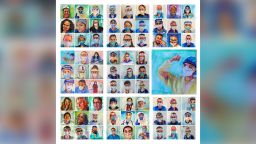
What began as two portraits for her cousins, who worked 13-hour shifts, seven days a week, at a Michigan hospital, turned into a mission to show appreciation and give encouragement to first responders. Now, she receives daily requests, mostly through her website but also through social media, for portraits.
One of the first faces she painted in watercolor was that of anesthesiologist Dr. Eliot Fagley, section head of critical care medicine at Virginia Mason Hospital in Seattle, near where she lives.
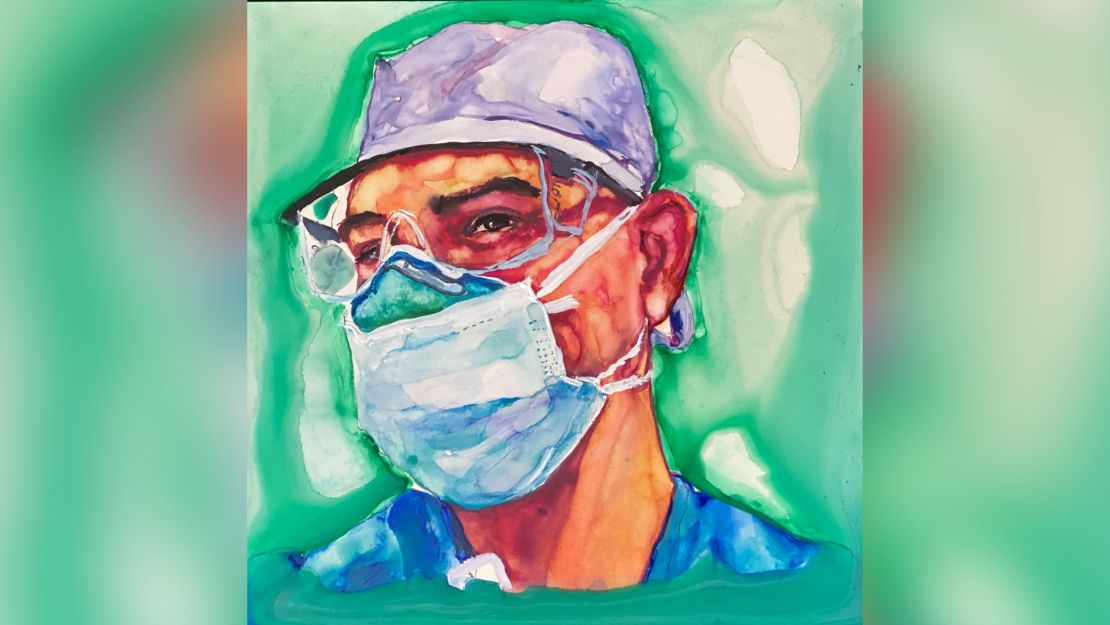
“In Dr. Fagley’s eyes, there was just so much ‘smile,’” she said. “And it seems — I’ve never met him — but he seems like an extremely kind person. And that definitely comes through.”
Fagley said seeing so much support and love from both Krishnan and the entire community at the start of the pandemic was “very touching.”
“What I think was really great about the paintings is that she really captured the essence of a lot of these folks,” he said. “There’s this little glimmer of joy in the eyes of everybody in each one of these paintings. And that glimmer comes from having the opportunity to help in some way.”
While Krishnan does put emotion and a story into every portrait, she said every set of eyes is different. “The younger ones, there is fear in those eyes. I can feel that when I’m painting,” she said.
Concern, kindness, happiness and bleakness are among the other emotions Krishnan has found in subjects and captured in her series.
And some have left a particular impression on the artist, like Vedika Sharma, a 36-year-old X-ray technician from Modesto, California, who died of the coronavirus and was painted at the request of her stepfather.
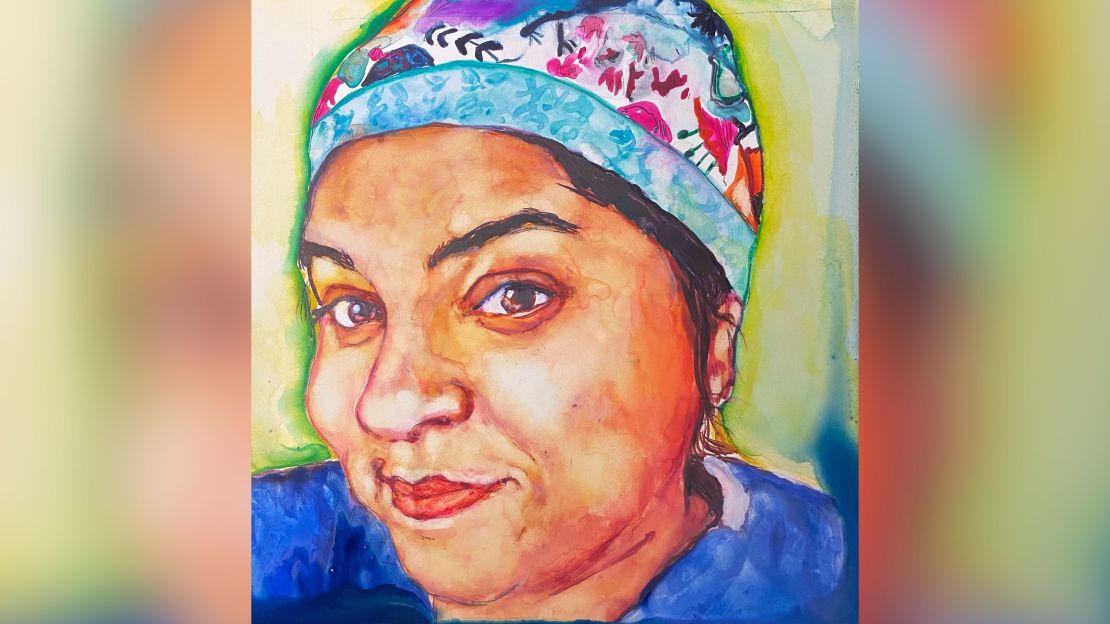
With this one, Krishnan found a “light in her eyes.”
“Something kind of strange happened — I picked colors that I usually never pick. And this turned out to be a super luminous painting, if I could use that word, and there was a lot of light and joy and cheer,” she said.
Despite beginning the process with the heavy weight of the story, she eventually found it to be “a joy to paint.”
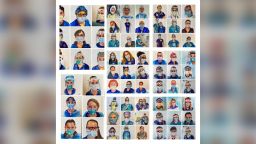
After Sharma’s family members were able to see Krishnan’s impression of their loved one, they told the artist she had, in fact, been an extremely bubbly, cheerful person.
Krishnan has used art to encourage others through the pandemic, like one emergency room doctor who confessed to her that she didn’t feel like she deserved a vaccine after so many of her patients who didn’t get to have one died from the virus. Krishnan said she sent this woman’s portrait with a special letter of encouragement, writing that she absolutely deserves it.
It has also been incredibly therapeutic and helpful for Krishnan managing her own emotions and stress during the pandemic.
“Art is wonderful because it gives you an outlet to deal with the anxiety that goes with this pandemic,” she said. “For me, a year ago I was just painting landscapes and thinking that I needed to find meaning for my artwork. And then this sort of happened.”
Showing support for frontline workers
Although it is nearly a year into her work on this project, Krishnan said she feels like now, more than ever, she must continue — and that others should, too, in their own ways of showing appreciation for responders. She finds it disrespectful to her subjects to see people “behaving irresponsibly” during the pandemic while doctors, nurses and other health care workers have worked so hard to save their patients.
Fagley said there are a few ways communities can show their first responders, like himself, support during what he calls the current “marathon” phase of the pandemic. Specifically, he said, trusting they are doing the best they can do is its own show of support.
“Your physicians and nurses and scientists and health care providers are really doing our best to navigate our way through this pandemic, with the absolute minimum loss of life and the absolute minimum loss of functionality,” Fagley said.
Get CNN Health's weekly newsletter
Sign up here to get The Results Are In with Dr. Sanjay Gupta every Tuesday from the CNN Health team.
At this point in the project and the pandemic, Krishnan is taking time to compile all the art and stories she has created and heard into a book — which she says can also be purchased as a donation for a first responder who may not be able to buy a copy as a keepsake for themselves. Her work is also on display at the Columbia City Gallery until March 21.
All of her portraits have made their way to the hands of their subjects except one: Dr. Anthony Fauci, who has been at the forefront of the US’s response to the pandemic as director of the National Institute of Allergy and Infectious Diseases.
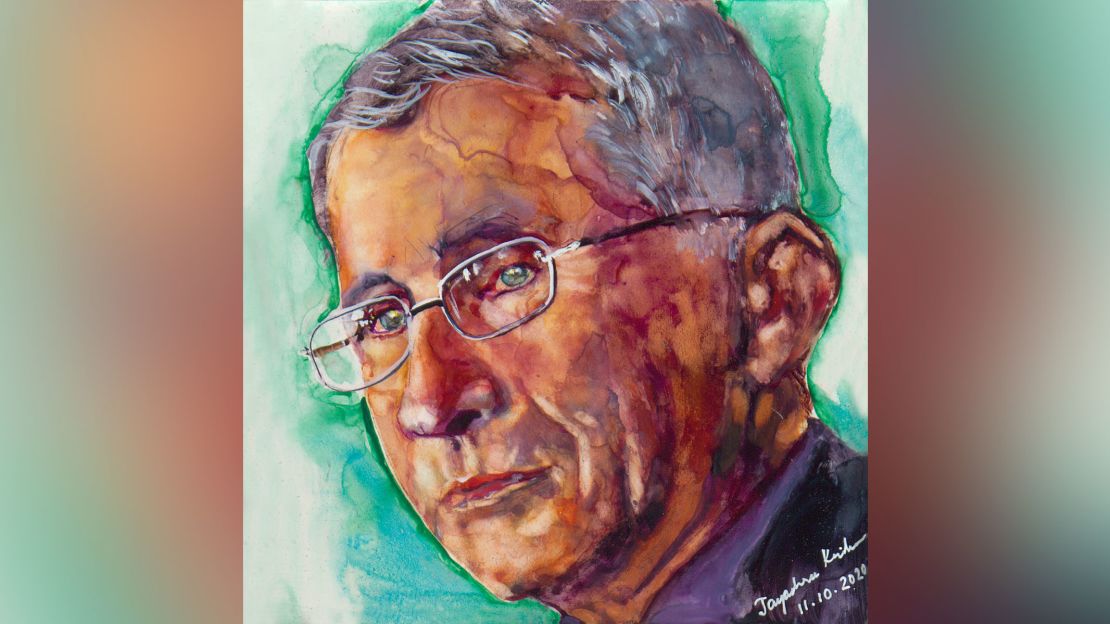
“And it would make me so happy if I can find a way to send it to him,” adds Krishnan, speaking on CNN’s Coronavirus: Fact vs Fiction podcast.
Just as she hit her milestone 150th portrait in her collection, Krishnan says she might not remember her subjects’ names that much, but she definitely remembers the eyes.
Correction: An earlier version of this story incorrectly listed the university where Jayashree Krishnan formerly taught.



